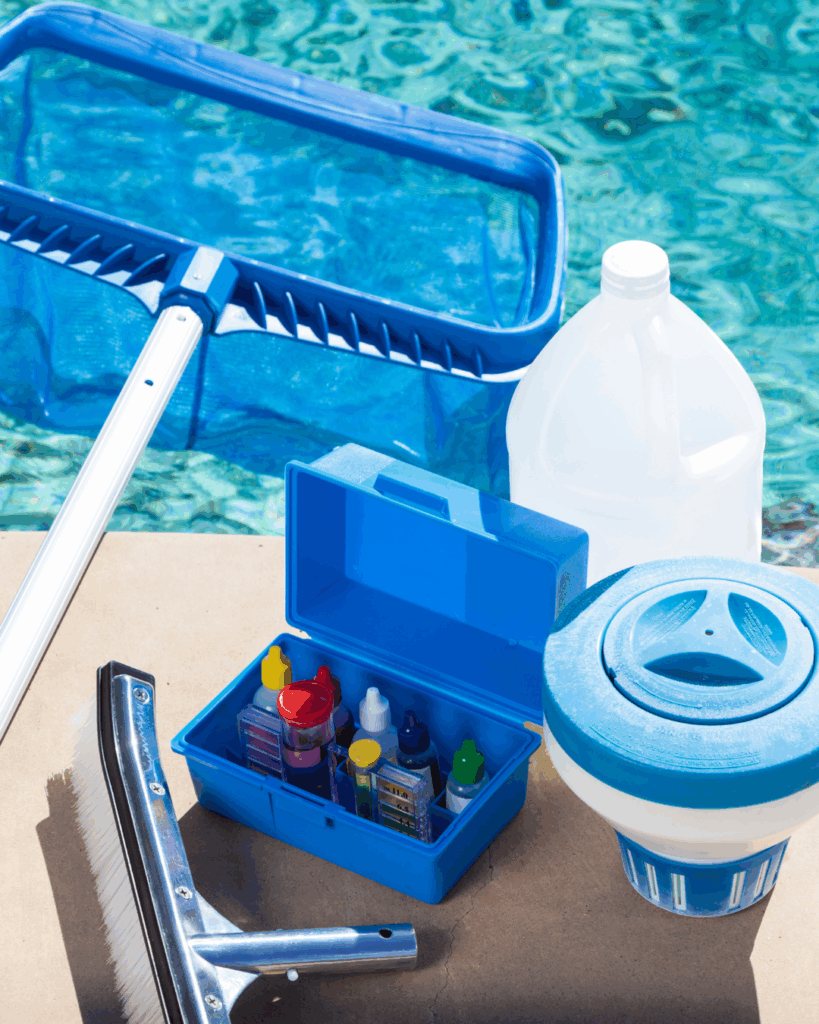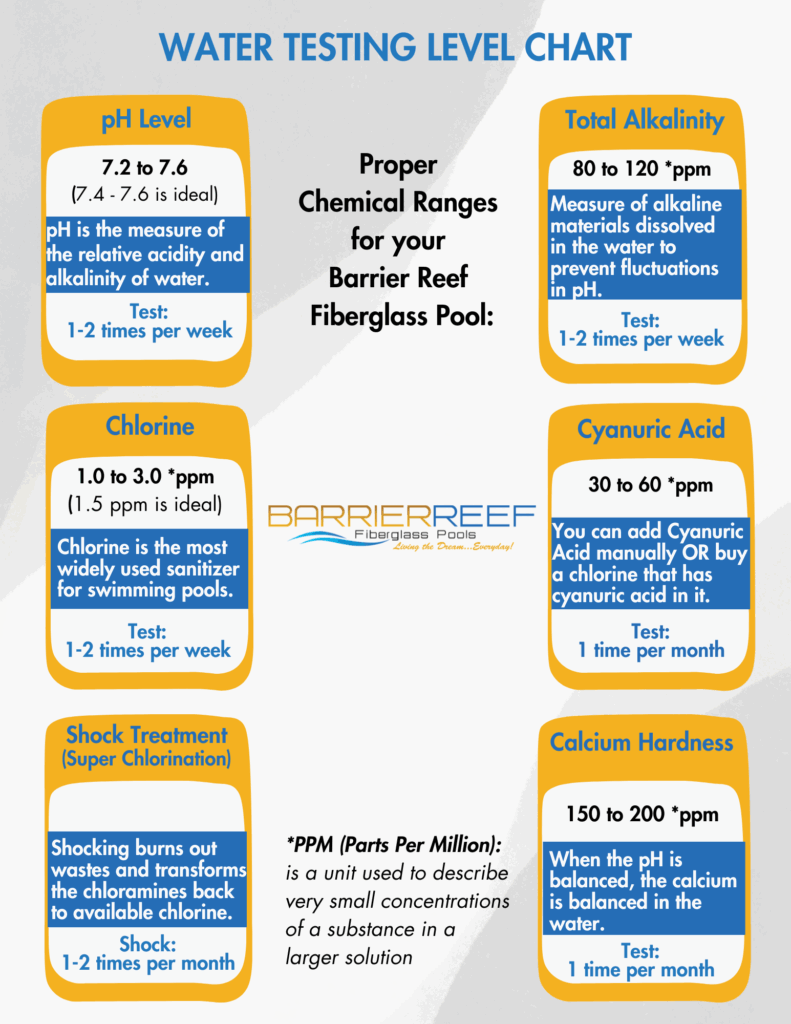Swimming Pool Care & Maintenance
How to Keep Your Fiberglass Pool Pristine All Summer Long
June 19, 2025
Your Barrier Reef Fiberglass Pool is a beautiful addition to your home, offering endless hours of relaxation, fun, and enjoyment. Whether you are looking for modern luxury, playful freeform design, or a plunge pool for a cozy space, Barrier Reef Fiberglass Pools has a wide variety of fiberglass pools.
Once you have your pool installed, you want to make sure it stays in pristine condition and provides you with years of enjoyment! It’s essential to protect your investment with proper maintenance. A well-maintained pool not only looks great but also prevents costly repairs and extends the life of your pool. In this blog we will discuss what supplies you need to care for your fiberglass pool, how often you should test various pool chemicals, and offer some pro-tips along the way.
What you need to maintain your fiberglass pool
Water Test Kit
A water test kit is a tool used to measure and monitor the chemical balance of your pool (or spa) water. It helps ensure that your water is safe, clean, and comfortable for swimmers—and that it won’t damage your pool surface or equipment.
Your test kit should be able to test Chlorine, pH, and total alkalinity.
Your test kit should also include the type and amount of products required to adjust your pool water chemistry.
Here are three types of water test kits:
Test Strips: Simple and easy to use, test strips are dipped into the pool water and then compared to a color chart to determine chemical levels.
Liquid Test Kits: These kits use reagents (liquid chemicals) that you add to a sample of pool water. The water changes color based on the chemical levels, and the results are compared against a color chart.
Digital Testers: More advanced and precise, digital testers use probes or photometers to measure chemical levels and display the results on a screen.
PRO TIP:
Appearance is not a reliable gauge of the condition of your pool water.
The only want to know the true condition of your pool water is to test it.
Here's a list of key chemicals you'll need:
Chlorine (Sanitizer)
Sodium Carbonate (pH increaser)
Sodium Bisulfate or Muriatic Acid (pH reducer)
Sodium Bicarbonate (Alkalinity increaser)
Calcium Chloride (Calcium hardness increaser)
Cyanuric Acid (Stabilizer/conditioner)
Sodium Hypochlorite (Shock treatment)
Salt (For saltwater pools)
Algaecide (Prevent algae growth)
Metal Sequestrant (Prevent staining and scaling from metals)
Regularly testing and adjusting your pool’s chemistry using these chemicals will help maintain a safe and balanced swimming environment, protecting both your pool and your swimmers. Remember to store all chemicals in a cool, dry place away from direct sunlight and out of reach of children and pets.
PRO-TIP
For best results when testing your pool water, take a sample from at least 18" below the surface opposite side of the return jet. Make sure to hold the test reagent bottles vertically when applying reagents to test cells. Chemical reagents should be replaced every year.

Let’s run through the different chemicals, what they do, and how to use them in your Barrier Reef Fiberglass Pool.
Total Alkalinity
Always check alkalinity first. The total alkalinity is the measure of alkaline materials dissolved in the water. Proper levels of alkalinity serve as a buffer to prevent fluctuations in the pH.
To increase your total alkalinity, add a total alkalinity increaser.
To lower your alkalinity, you may need to add doses of sodium bisulfate (dry acid) or Muriatic Acid.
Always follow the directions of the chemical container.
Total Alkalinity kept in the proper range with help stablilize pH levels.
pH Control
pH is the measure of the relative acidity and alkalinity of water. The pH scale runs from the high acid range of 0 to the highly alkaline range of 14. A pH level of 7 is considered neutral. The ideal and most comfortable range for your Fiberglass pool water is a pH between 7.2 to 7.6 (Ideal 7.4 to 7.6)
pH that is too low (Below 7.2) will cause eye burning, skin irritation, corrosion of pool surface, pool equipment and fittings and rapid loss of chlorine. Add a Sodium Carbonate to raise the pH.
pH that is too high (Above 7.6) will cause loss of chlorine effectiveness, scaling on your pool surface, cloudy water and ideal conditions for algae growth. Add Sodium Bisulfate or Muriatic Acid to lower pH as directed by the manufacture of the product you are using.
What causes your pH to change?
pH can vary from week-to-week, even day-to-day. Factors that affect pH include swimmers, rainwater, fresh water, chlorine and total alkalinity.
Chlorine
Chlorine is the most widely used effective and economical sanitizer for swimming pools. Chlorine controls algae, effectively kills bacteria and other disease causing organisms, and removes waste products through oxidation. You should maintain low, but constant chlorine levels. Between 1.0 to 3.0 ppm (1.5 is ideal).
Shock Treatment (Super Chlorination)
Why do I need to shock my pool?
Waste enters the pool through wind, rain, and people. Many of these wastes are not filterable and combine with the chlorine to form chloramines, a chlorine nitrogen complex. Chloramines cause eye irritation and reduce the amount of free chlorine available to provide sanitation. A buildup of waste (in the form of Chloramines) also causes the water to become cloudy or have a dull appearance.
What shocking does?
Shocking burns out wastes and transforms the chloramines back to free available chlorine. Shocking uses oxidation to restore the pool water to a sparking, sanitary, comfortable condition. Normal chlorine levels are usually unable to accomplish this.
How and when to shock?
Shocking should be done every one to two weeks. Especially after heavy pool use and warm water temperatures. Preferably shock the pool in the evening. Follow directions on the shock packaging.
Pro-Tip: Additional shock may be needed after a rainstorm, heavy use, hot weather, or additional freshwater filling. Also, if your pool is overflowing from weather, it is advisable to wait for a period of 48 hours before lowering water to normal operating level.
Calcium Hardness
Calcium naturally occurs in water. Different areas of the country have higher and lower levels of calcium in the water. The higher the calcium concentration in the water, the more prone the pool is to calcium leeching. When the pH is maintained between 7.2 and 7.6, the calcium is balanced in the water.
Calcium levels should be maintained between 150 to 200 ppm.
When the pH rises above 7.4, calcium begins to precipitate out of the water and cling to the swimming pool surface. The higher the pH is allowed to go, the more pronounced the calcification can become. The problem occurs more often in areas with higher natural concentration of calcium in the water (also known as hard water).
Pool Stabilizer (Cyanuric Acid)
Sunlight is a major factor in the consumption of chlorine. When cyanuric acid is added to the pool water, it makes the chlorine more resistant to the UV rays of the sun. Chlorine stabilizer helps keep your chlorine levels more constant while reducing your chlorine costs.
Weekly Checklist:
- Clean leaf basket in skimmer box
- Observe and clean lint pot in pump
- Check pressure on the filter - clean if necessary
- Brush pool walls and floor
- Vacuum if needed
- Test Pool Water (Chlorine, pH, and alkalinity)
1-2 times a month Checklist:
- Shock Treatment
- Test Calcium Hardness
- Cyanuric Acid
Understanding Langelier Saturation Index (LSI)
Keeping your fiberglass pool looking pristine goes beyond regular cleaning—understanding water chemistry is key, and one of the most important aspects to master is the Langelier Saturation Index (LSI). Although often overlooked, LSI plays a crucial role in maintaining the long-term health and appearance of your pool.
What is the Langelier Saturation Index (LSI)?
The Langelier Saturation Index, developed by Dr. Wilfred Langelier in the 1930's, measures your pool waters saturation level with calcium carbonate. This index provides an unbiased snapshot of your pool waters balance, where an LSI value of zero indicates perfect equilibrium. For fiberglass pools, maintaining an LSI between -0.3 to +0.3 is ideal to protect the surface, while saltwater pools benefit from a slightly narrower range of -0.2 to +0.2 due to their unique chemistry.
Why does LSI Matter for Your Fiberglass Pool?
Preventing Scale Build-Up: A high LSI value means your water is oversaturated with calcium carbonate, which can lead to scale formation. Scale deposits not only mar the pool’s appearance but can also clog and damage your filtration system.
Avoiding Corrosion and Surface Damage: On the other hand, a low LSI value indicates that your water is corrosive, which can damage your fiberglass pool gel coat. Corrosive water can cause chalking and deterioration of the pool surface, compromising both its look and integrity.
Comprehensive Water Balance: While it's important to keep individual chemicals like pH, alkalinity, and calcium hardness in check, LSI provides a holistic measure of your water’s overall balance. By maintaining a proper LSI, you protect your pool’s surface, equipment, and overall investment.
In Conclusion
Keeping your Barrier Reef Fiberglass Pool in pristine condition doesn’t have to be complicated—just consistent. With the right tools, routine care, and a solid understanding of your pool’s chemistry, you’ll enjoy a sparkling, safe, and beautiful backyard oasis all summer long. And if you’re just beginning to dream about owning a pool, now is the perfect time to take the plunge. Find a Barrier Reef Fiberglass Pools authorized dealer near you and start “Living the Dream Every Day.”

Evaporation vs Autofill: Understanding Float Valve Water Leveler Systems
June 15, 2024Maintaining a swimming pool involves more than just keeping it clean; it also means ensuring that the water level is optimal. One of the most vexing issues facing pool owners is water evaporation, which causes significant and constant water loss over time. Fortunately, float valve water leveler "autofill" systems offer an effective solution to this problem.

Pool Cleaners: Different Types & Functions
May 18, 2024Every pool owner knows that keeping your pool clean is a vitally important part of responsible pool ownership; when well done, it can make all the difference in the beauty, longevity, and functionality of your pool.
Maintaining a clean swimming pool is essential for swimmers' health and safety, the long-term usefulness of pool equipment, and the overall enjoyment and aesthetics of the pool environment.
Regular cleaning, proper chemical balance, and routine maintenance are key components of effective pool care. However, with the right cleaner, maintaining a pristine fiberglass swimming pool can be simple and relatively easy.

Tips For Extending the Life of Your Fiberglass Pool
November 30, 2023- 1
- 1-4 of 4 results